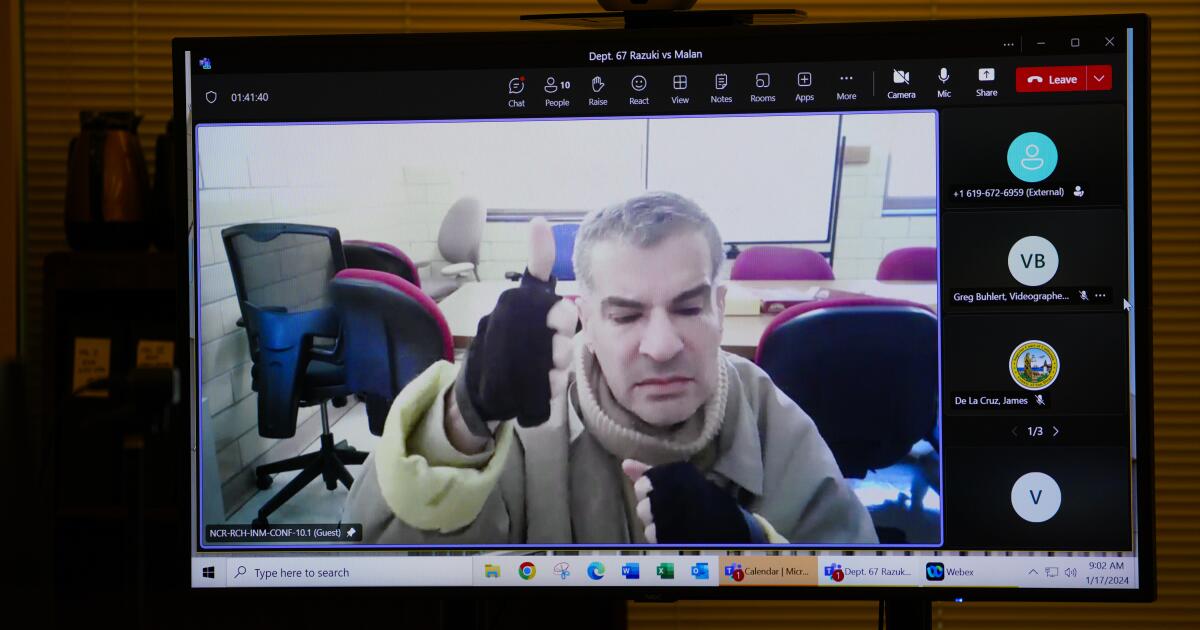
A San Diego judge has ruled that a businessman who tried to have his partner kidnapped and potentially killed has “unclean hands” and cannot prevail in a multi-million-dollar lawsuit against the victim of the kidnapping plot.
In the decision handed down Friday, Feb. 2, following a three-day trial last month, Superior Court Judge Eddie Sturgeon ruled that the kidnap-plot victim, who was the defendant in the civil trial, couldn’t recover damages either, possibly leaving both men with huge legal bills. The ruling brought a rather anticlimactic end to a nearly six-year-old lawsuit that had been rocked by the alleged murder-for-hire plot and then dragged out while awaiting resolution of the criminal case.
The trial pitted businessman Salam Razuki against his former partner, Ninus Malan, in a dispute over several cannabis ventures and hinged on the legal doctrine of “unclean hands,” which essentially bars a plaintiff from taking illegal or unethical actions relating to the underlying lawsuit. Razuki sued Malan in 2018 over the ownership stake in a Kearny Mesa dispensary and some production facilities, alleging Malan cost him about $20 million by cutting him out of the deals. Malan quickly filed a cross-complaint alleging Razuki had no rightful claim to his cannabis ventures and was using the lawsuit to try to steal his companies.

Ninus Malan and his attorney, Ben Anderson, during last month’s trial before San Diego Superior Court Judge Eddie Sturgeon.
(Nelvin C. Cepeda/The San Diego Union-Tribune)
Just days after Malan filed the counter lawsuit, Razuki and two associates began plotting a scheme to have Malan kidnapped and taken to Mexico “for the purpose of intimidation or murder,” according to their eventual plea agreements. Federal prosecutors and a U.S. district judge said it appeared the plan was to have Malan killed in Mexico.
The plot was doomed from the start because their hired muscle was an FBI informant. According to evidence in the criminal case, Razuki believed Malan had been killed — a rouse set up by the FBI — and the trio paid the informant $2,000, half of it before and half of it after they believed the man had carried out their plan.
After the trio pleaded guilty, a federal judge sentenced Razuki and Sylvia Gonzales to seven years each in prison. Elizabeth Juarez, who had a more minor role, was sentenced to three years and 10 months in prison.
That’s why Razuki was in custody at a federal prison hospital facility in Minnesota when he testified via video last month in his trial against Malan, answering “yes” or “no” questions with his thumb up or down because of an undisclosed medical condition that has apparently left him unable to speak.
Ben Anderson, Malan’s attorney, asked Razuki just a few questions during cross-examination, all of them centered on the criminal kidnapping plot rather than the business disputes. It was a sign of Anderson’s theory of the case and the focus of his defense — that Razuki had “unclean hands,” a legal doctrine that essentially holds that a plaintiff such as Razuki cannot win a lawsuit and be awarded damages if he engages in “inequitable behavior” as it relates to the lawsuit.
Anderson told the judge in both his opening statements and closing arguments that Razuki had unclean hands due to both the kidnapping scheme and an alleged threat he made to burn down the business of another man previously involved in the lawsuit.
“The only thing more egregious would be if he actually killed him,” Anderson told the judge during closing arguments. “How much further do we need to go to invoke unclean hands?”
Sturgeon, who decided in the case in lieu of a jury, agreed with Anderson’s theory.

San Diego Superior Court Judge Eddie Sturgeon listens to testimony last month in the civil trial between Salam Razuki and Ninus Malan.
(Nelvin C. Cepeda/The San Diego Union-Tribune)
“The Court finds the doctrine of unclean hands applies to all of Razuki’s claims,” Sturgeon wrote in his decision. “The Court rules any and all claims by Razuki … are entirely barred.”
Razuki’s attorney did not respond to a request for comment Monday.
Malan was largely pleased with the judge’s ruling but disappointed he was not awarded any damages from his cross-complaint. At trial, Anderson had argued Malan was entitled to about $16 million in damages.
“I’m grateful that Judge Sturgeon found Razuki to have unclean hands,” Malan said Monday.
Malan also said he was grateful that Sturgeon ruled that he owned the stakes he said he owned in several properties and businesses at the heart of the dispute.
“Razuki tried everything he could in his power to try to get rid of me,” Malan said. “First he tried to kidnap me and have me murdered. Then his plan was to financially bleed me to get me to give up.”
Malan said neither of those plans worked, and as the prevailing party, he’ll file a motion seeking to be awarded “millions of dollars” in attorney fees.
While Sturgeon’s ruling closes one chapter of the saga between Razuki and Malan, there is more to come. Malan has sued Razuki and 18 other defendants over the kidnapping and alleged murder-for-hire plot. That case could go to trial later this year.






